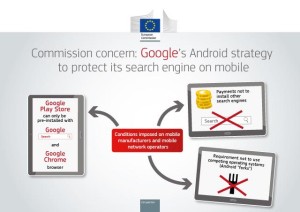| April 20, 2016 
A View from Constantine Cannon’s London Office By Richard Pike and Yulia Tosheva Just as expected, following a one-year investigation and a number of information requests, the European Commission formally announced today that it is accusing Google’s parent company, Alphabet, of abusing its dominant position in relation to the Android mobile operating system. Google is already facing antitrust charges from Brussels over promoting its own shopping service in online searches. The stakes seem higher for Google in the Android case, however, as it made about $11 billion last year from advertising sales on Android phones through its apps such as Maps, Search and Gmail, according to estimates by financial analyst Richard Windsor.[1] About 80% of smartphones and tablets globally run on Android.[2] 
click here for more » Leave a comment » Categories: Antitrust Enforcement, International Competition Issues April 18, 2016 Here are some of the developments in antitrust news this past week that we found interesting and are following. Rise of Institutional Investors Raises Questions of Collusion. BlackRock, Vanguard and other big institutional investors own roughly 70 percent of the public stock market, according to some reports. People are starting to ask whether this allows companies — now having the same owners — to compete less and raise prices. In Senate testimony last month, the Justice Department’s antitrust chief, William J. Baer, said the department was investigating the potential antitrust implications of the rise of institutional shareholders. Exclusive: Trading start-ups prep major bank antitrust suits. Two online trading start-ups are reportedly preparing antitrust suits alleging that major banks conspired to block customers from using their platforms to trade interest rate swaps. TeraExchange and Javelin Capital Markets will claim the banks threatened to cut off customers who tried to trade on the platforms, according to sources. Bank of America Merrill Lynch, Barclays, BNP Paribas, Citigroup, Credit Suisse, Deutsche Bank, Goldman Sachs, HSBC, JP Morgan, Morgan Stanley, Royal Bank of Scotland and UBS will be named, the sources said. Deutsche Bank settles U.S. gold, silver price-fixing litigation. Deutsche Bank AG has agreed to settle U.S. lawsuits accusing it of conspiring with other banks to manipulate gold and silver prices at investors’ expense, according to court papers. The settlements were disclosed in letters filed in Manhattan federal court by lawyers representing investors and traders who accused Deutsche Bank of violating U.S. antitrust law. Terms were not disclosed, but both settlements will include monetary payments by the German bank. Deutsche Bank also agreed to help the plaintiffs pursue claims against other defendants. Canadian Pacific Ends Bid for Norfolk Southern. After five months of pressure, three merger offers and one rejection from regulators, Canadian Pacific Railway said that it had abandoned efforts to combine with its American railroad counterpart Norfolk Southern. Canadian Pacific withdrew a resolution for Norfolk Southern shareholders to vote on negotiations between the two companies, according to a statement by Canadian Pacific. Norfolk Southern resisted the proposed railroad merger from the beginning, and the termination joins a string of proposed deals that have fallen apart in the last week because of regulatory concerns. Leave a comment » Categories: Antitrust Enforcement, Antitrust Litigation April 4, 2016 Here are some of the developments in antitrust news this past week that we found interesting and are following. FTC Accuses Endo, Other Drugmakers of Antitrust Violations. The Federal Trade Commission has accused several drugmakers of violating antitrust laws by agreeing to delay the U.S. launches of cheaper generic versions of two popular pain treatments. It’s the first so-called “pay for delay” case brought by the FTC in which a drug’s original maker agreed not to sell its own “authorized generic” version until well after a generic drugmaker began selling its product. These arrangements guaranteed the generic drugmakers would have no competition, and so could keep prices high, for at least six months. The FTC alleges Endo Pharmaceuticals Inc., maker of Opana ER pain pills and the Lidoderm pain patch, paid Impax Laboratories Inc. and Watson Laboratories Inc., respectively, to delay selling their approved generic versions. Uber CEO must face price-fixing lawsuit by passengers -U.S. judge. Uber CEO Travis Kalanick failed on Thursday to win the dismissal of an antitrust lawsuit accusing him of scheming to drive up prices for passengers who use the popular ride-sharing service. U.S. District Judge Jed Rakoff in Manhattan said Kalanick must face claims he conspired with drivers to ensure they charge prices set by an algorithm in the Uber smartphone app to hail rides, including “surge pricing” during periods of peak demand. The plaintiffs claim that drivers conspired with Kalanick to charge fares set by the algorithm, with an understanding that other Uber drivers would do the same, even if they might fare better acting on their own. China antitrust proposals trigger foreign business fears over IP protection. Foreign companies with dominant market positions could be increasingly forced to license technology to competitors or face sanctions under China’s latest draft antitrust policy guidelines, according to foreign business groups and attorneys. The proposals include a so-called “essential facilities” doctrine, which assumes some core infrastructure and technology is so important, or the barriers to entry so high, that refusal to share constitutes monopolistic behavior. If interpreted broadly, China’s antitrust policy could force companies to license their intellectual property to Chinese competitors or lower licensing costs to benefit local firms, at a time when China is seeking to promote domestic champions. EU Opens In-Depth Investigation Into Hutchison, Vimpelcom Italian Deal. European Union antitrust regulators have opened an in-depth investigation into Hutchison’s planned merger of its Italian mobile telecoms business with Vimpelcom’s, on concerns it could lead to higher prices for consumers. “The Commission has concerns that the transaction could lead to higher prices, less choice and reduced innovation for mobile customers in Italy,” the European Commission said in a statement on Wednesday. Leave a comment » Categories: Antitrust Enforcement, Antitrust Litigation, International Competition Issues April 1, 2016 
A View from Constantine Cannon’s London Office By Yulia Tosheva and Irene Fraile The UK Payment Systems Regulator (“PSR”) has published a final guidance on its approach to monitoring compliance with the EU Interchange Fee Regulation (“IFR”), which is changing the way payment systems operate in Europe. The PSR, which was launched in April 2015, is an independent economic regulator that oversees the UK payments industry. The PSR is the first regulator of its kind in the world. The final guidance, which was issued on March 24, 2016, is of particular interest to payment card schemes, banks and merchants as it is the first document to shed light on the practical application of the IFR in the UK. In view of the maturity and importance of the UK payment systems industry (currently valued at £75 trillion), the PSR’s guidance may assist other EU regulators in their implementation of the IFR. It contains detailed provisions on the powers of the PSR to conduct investigations and to give directions, information-gathering, dispute resolution, and penalties for non-compliance. click here for more » Leave a comment » Categories: Antitrust Enforcement, International Competition Issues March 30, 2016 By Robert M. Cross The scope of antitrust liability for competitors engaged in cooperative processes—such as setting benchmark interest rates—became murkier this week with a decision by the U.S. District Court for the Southern District of New York holding that manipulation of such a cooperative process could give rise to a viable price-fixing claim. On Monday, Judge Jesse M. Furman held in Alaska Electrical Pension Fund v. Bank of America Corporation, 14-cv-07126(JMF) (S.D.N.Y. 2016), that a group of “otherwise-competing” entities who are engaged in a cooperative process in which they do not compete may still be subject to antitrust liability if they conspire “to manipulate prices (or components thereof).” Id. at 16.[1] Significantly, Judge Furman disagreed with the Southern District of New York’s previous holding in In re LIBOR-Based Financial Instruments Antitrust Litigation, 935 F. Supp. 2d 666 (S.D.N.Y. 2013) (“LIBOR I”), that engaging in a “cooperative endeavor” to manipulate prices insulates “otherwise-competing” entities from antirust liability. Id. at 16. These dueling decisions underscore the disagreements among jurists within the Southern District and contributes to the lack of clarity surrounding the scope of antitrust liability for actors who are normally competitors, but engage in cooperative, non-competitive, endeavors in which they allegedly manipulate prices. Id. at 2. The LIBOR I case is currently on appeal to the Second Circuit. The Second Circuit’s ruling on that appeal may ultimately provide parties with more guidance on this complex issue. click here for more » Leave a comment » Categories: Antitrust Enforcement, Antitrust Litigation « Previous Entries Next Entries » | | | |


